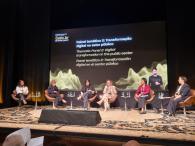Government officials and policymakers from across the globe are currently participating in the UN-Portugal Digital Fellowship. This programme is aimed at supporting the improvement of national and international policies of the UN Member-states, as well as ways to create a platform of interaction between countries facing similar digital transformation challenges.
This Fellowship is a product of the work between UNU, the Portuguese Ministry of Foreign Affairs and Camões, Institute for Cooperation and Language, I.P.
Over the week, the fellows will immerse themselves in topics such as artificial intelligence, cybersecurity, governance, and user experience, all while exploring what it takes to build truly inclusive digital societies.
Cross-Border Learning
"This Fellowship offers participants a chance to explore different national approaches to digital governance while learning from one another", said Delfina Soares, Director of UNU-EGOV, as she welcomed the most recent cohort.
During the opening ceremony, Dr. Pedro Oliveira, also set the tone for people-centred digital transformation, saying, "The impact of digital technology on our societies runs too deep to overlook. I could also see how much technology can shake families and community foundations".
Dr. Oliveira brought to the discussion some examples from São Tomé and Príncipe, where digital solutions are already changing lives. From telemedicine reaching remote islands to streamlined government services that work for citizens, the potential is clear.
"Social media and fake news go hand in hand, and this reality pushes decision-makers to act with responsibility" – Pedro Oliveira, Vice-President of Camões, Instituto da Cooperação e da Língua, I.P.
Dr. Oliveira brought to the discussion some examples from São Tomé and Príncipe, where digital solutions are already changing lives. From telemedicine reaching remote islands to streamlined government services that work for citizens, the potential is clear.
"Social media and fake news go hand in hand, and this reality pushes decision-makers to act with responsibility" – Pedro Oliveira, Vice-President of Camões - Instituto Camões, Instituto da Cooperação e da Língua, I.P
Agenda
The fellowship comprises 13 modules, covering Digital Innovation and Transformation, Human Rights, Innovation, Citizen-centred Participation and many more topics of interest to the representatives of UN Member-states.
The modules will be delivered by UNU-EGOV researchers, alongside leading experts from Portugal's digital scene, including Paulo Vale from the Agency for Administrative Modernisation (AMA) and Lino Santos from the National Cybersecurity Centre.
Looking Forward
This programme operates differently from typical capacity-development initiatives. It's built on the principle that when digital leaders face similar challenges but work within different systems, they can find solutions faster by learning from each other's successes and failures, ultimately shaping how governments will serve their citizens in the years ahead.
The initiative also includes the creation of a network between participating countries and the UNU-EGOV research community, ensuring long-term impact and fostering ongoing collaboration. When challenges arise, the goal is for the participants to have a platform so they can reach out to each other to share experiences and solutions.
The UN-Portugal Digital Fellowship is running from 26th to 30th of May 2025 in Guimarães, Portugal.




